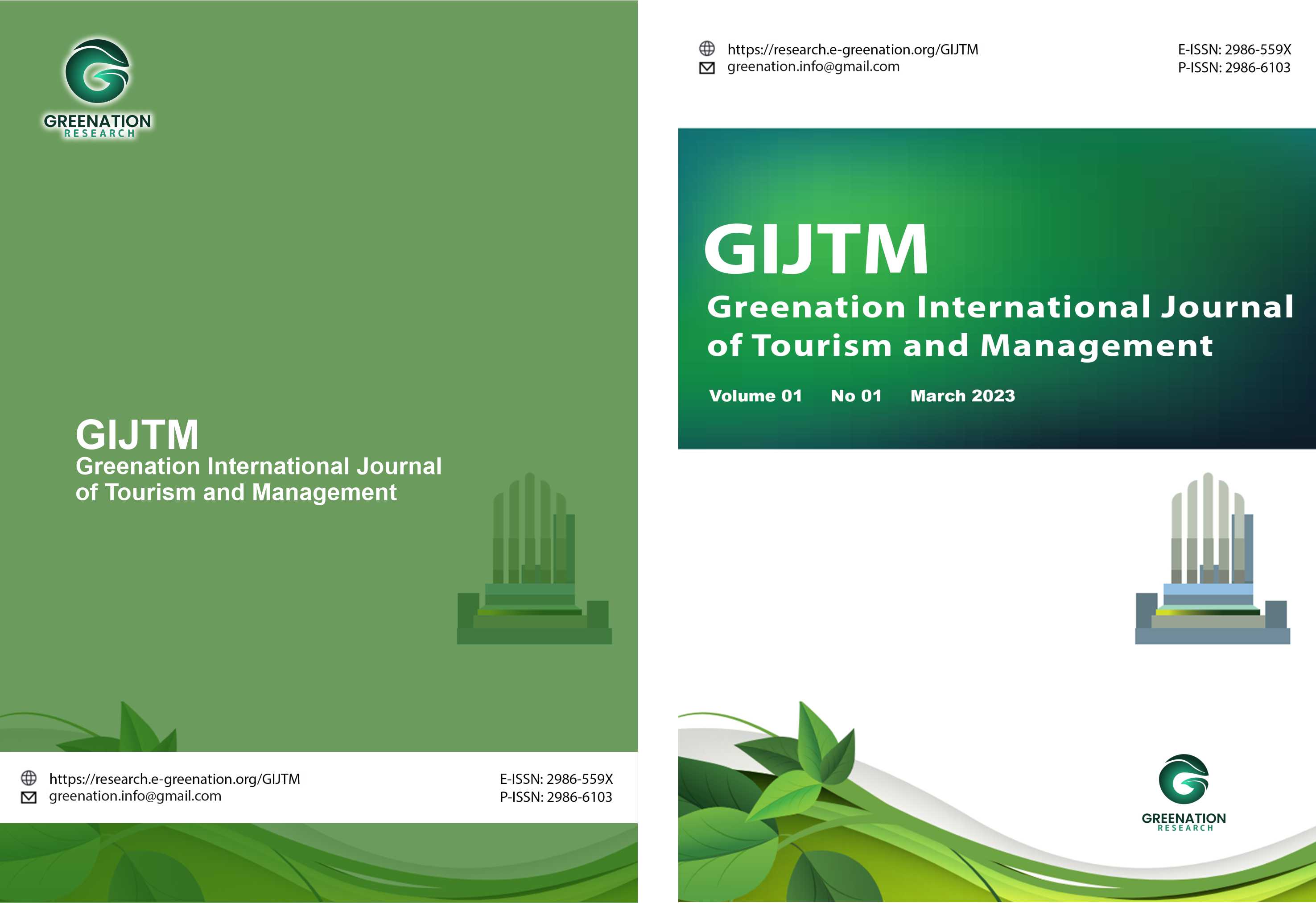Exploring Students' Perceptions of Open Trip to Lombok: Digital-Based Tourism Strategies in the Gen Z Era
DOI:
https://doi.org/10.38035/gijtm.v3i2.378Keywords:
Open Trip, Students, Lombok Tourism, Consumer Perception, Digital PromotionAbstract
This study aims to explore students' perceptions of the open trip program to Lombok offered during the semester break, using a qualitative descriptive approach. Open trip programs are one of the popular forms of travel among students because they offer affordable costs, short time, and meaningful social experiences. A bold survey using Google Form successfully collected data from 230 students from various universities in Indonesia. The data were analyzed using thematic analysis techniques, with open coding, axial coding, and triangulation of meaning to identify the main themes of the respondents' narratives. The results of the study revealed five main themes: (1) students' positive perceptions of Lombok's attractiveness as a tourist destination, (2) motivations and obstacles in participating in open trips, (3) expectations of the contents of the travel package, (4) effective promotional strategies based on social media, and (5) correlation of perceptions with students' demographic backgrounds. These findings indicate the importance of targeted digital marketing strategies, the preparation of tour packages that suit students' needs, and collaboration with campus organizations. This study provides practical contributions for tourism managers and open trip providers in designing programs that are more contextual and attractive to the student segment.
References
Bonang, D., Hasanah, S. M., Nugroho, M. S., & Fitriyah, A. T. (2022). Geopark Rinjani, sport tourism, and the rise of local participation post COVID in Lombok, Indonesia. Journal of Environmental Management & Tourism, 13(4), 1207–1214.
Braun, V., & Clarke, V. (2006). Using thematic analysis in psychology. Qualitative Research in Psychology, 3(2), 77–101. https://doi.org/10.1191/1478088706qp063oa
Creswell, J. W., & Poth, C. N. (2018). Qualitative Inquiry and Research Design: Choosing Among Five Approaches (4th ed.). SAGE Publications.
Ernawati, N. M., Sitawati, A. A. R., & Muliati, N. K. (2018). Batur toward sustainable tourism development - A community-based geotourism case from Bali in Indonesia. Journal of Environmental Management and Tourism, 9(2), 291–297. https://doi.org/10.14505/jemt.v9.2(26).09
Hudson, S., Roth, M. S., Madden, T. J., & Hudson, R. (2015). The effects of social media on emotions, brand relationship quality, and word of mouth: An empirical study of music festival attendees. Tourism Management, 47, 68–76. https://doi.org/10.1016/j.tourman.2014.09.001
Ilhamalimy, R. R., Husen, A., & Sihotang, D. S. (2025). The Role of Education in Tourism Development?: Focus on Attractions , Amenities , and Accessibility. 7(2), 167–176. https://doi.org/10.54268/baskara.v7i2.25224
Ilhamalimy, R. R., Suhud, U., & Wibowo, S. F. (2025). The Shift of Tourism Destinations from Bali to Lombok?: A Conceptual Analysis of Tourism Security and Competitiveness. 5(2), 134–139.
Lusianawati, H., & Widaningsih, T. (2024). Persepsi Wisatawan Gen Z Dalam Menggunakan Bis Wisata Jakarta Explorer. … Pariwisata Dan Kewirausahaan (SNPK …, 3(April), 43–53. http://usahid.ac.id/conference/index.php/snpk/article/view/205%0Ahttp://usahid.ac.id/conference/index.php/snpk/article/download/205/168
Meenakshy, M., Prasad, K. D. V., Bolar, K., & Shyamsunder, C. (2024). Electronic word-of-mouth intentions in personal and public networks: a domestic tourist perspective. Humanities and Social Sciences Communications, 11(1), 1–15. https://doi.org/10.1057/s41599-024-03753-4
Miles, M. B., Huberman, A. M., & Saldaña, J. (2014). Qualitative Data Analysis: A Methods Sourcebook (3rd ed.). SAGE Publications.
Rafqi Ilhamalimy, R., & Ali, H. (2021). Model Perceived Risk and Trust: E-Wom and Purchase Intention (the Role of Trust Mediating in Online Shopping in Shopee Indonesia). Dinasti International Journal of Digital Business Management, 2(2), 204–221. https://doi.org/10.31933/dijdbm.v2i2.651
Sari, D., Kusumah, A. H. G., & Marhanah, S. (2018). Analisis Faktor Motivasi Wisatawan Muda Dalam Mengunjungi Destinasi Wisata Minat Khusus. Journal of Indonesian Tourism, Hospitality and Recreation, 1(2), 11–22. https://doi.org/10.17509/jithor.v1i2.13762
Sihotang, D. S., Ilhamilimy, R. R., & Rizan, M. (2025). Mapping Trend of Digital Marketing Shapes Consumer Behaviour Across Indonesia?: A Literature Review and Integration of Artificial Intelligence on Research Design for Future Research. 2(4), 295–310.
Sutrisno, A. D., Lee, C.-H., Suhardono, S., & Suryawan, I. W. K. (2024). Empowering communities for sustainable transition: integrating tourism with economic and sociodemographic dynamics in post-mining strategies. Geo Journal of Tourism and Geosites, 55(3), 1112–1123.
Utami, Y. S., Utari, P., & Kartono, D. T. (2024). Examining The Experience and Interest in Using Digital Maps as A Tourism Communication Medium Among Visitors in Bantul Regency, Indonesia. Prahastiwi and Kartono, Drajat Tri.
Zhao, Y., Yang, J., Song, J., & Lu, Y. (2025). The Effects of Tourism Motivation and Perceived Value on Tourists’ Behavioral Intention Toward Forest Health Tourism: The Moderating Role of Attitude. Sustainability (Switzerland), 17(2). https://doi.org/10.3390/su17020713
Downloads
Published
How to Cite
Issue
Section
License
Copyright (c) 2025 Ridho Rafqi Ilhamalimy, Usep Suhud, Mohamad Rizan

This work is licensed under a Creative Commons Attribution 4.0 International License.
Copyright :
Authors who publish their manuscripts in this journal agree to the following conditions:
- Copyright in each article belongs to the author.
- The author acknowledges that the Greenation International Journal of Tourism and Management (GIJTM) has the right to be the first to publish under a Creative Commons Attribution 4.0 International license (Attribution 4.0 International CC BY 4.0).
- Authors can submit articles separately, arrange the non-exclusive distribution of manuscripts that have been published in this journal to other versions (for example, sent to the author's institutional repository, publication in a book, etc.), by acknowledging that the manuscript has been published for the first time at GIJTM.

























